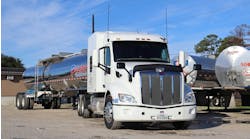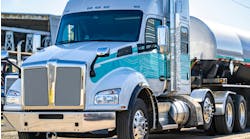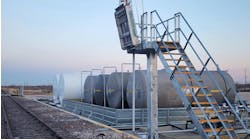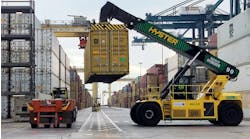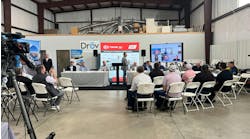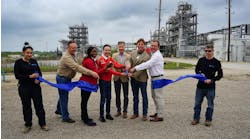The fuel supply business looks much different today than it did in 1921, when Raymond Demere founded the company that became the Colonial Group while endeavoring to energize the new internal combustion engines helping motorized vehicles quickly surpass horse-drawn wagons as the primary means of transport.
Modern power units are more efficient, the bulk tanks are bigger and bolder, and 21st-century logistics technology truly is transformative.
But the overriding objectives that fueled Demere’s post-World War I dream remain undiminished under the Savannah, Ga.-based company’s fourth generation of family leadership: To deliver the best possible products and services, at the lowest plausible prices, and send everyone home the same way they arrived.
So as the Colonial Group, now one of the largest privately held U.S. companies—with nine active subsidiaries and more than 2,000 employees—celebrates 100 years, Raymond’s great-grandchildren, CEO Christian Demere and Houstoun Demere, a Colonial vice president, continue to adhere to the timeless tenets most likely to spark another century of success—a stubborn dedication to deploying an elite fleet of drivers and equipment, and an unwavering commitment to safe, efficient tank truck operations.
“There were three generations and 100 years of leadership before me,” said Christian, who succeeded his father, Robert Demere Jr., as CEO in January. “Over the years, there has been a lot of effort and sacrifice by many people to get the company where it is today. It’s a collective effort across the entire team of employees at Colonial, and I take great comfort and pride in knowing how many incredible people we have that support the company.”
Vertically invigorated
Raymond Demere registered Savannah’s first independent wholesale petroleum company as American Oil Company on July 21, 1921. He changed the company’s name to Colonial Oil in 1933, and the next year relocated the business to a 21-acre site on the Savannah River that remains the home of the Colonial Group’s corporate headquarters.
Today, the Group’s nine subsidiaries include Colonial Oil Industries (COI), Colonial Terminals (CTI), Colonial Fuel & Lubricant Services (CFLS), Colonial Chemical Solutions, and the Enmarket chain of convenience stores.
CTI operates four liquid and dry bulk storage facilities (with five total terminals), two on the same Savannah site as the corporate headquarters, one upriver in Garden City, Ga., and another in Wilmington, N.C., with access to Cape Fear River. Their combined storage capacity includes 4.41 million barrels of liquid bulk and 205,800 stones of dry bulk, and all four locations include access to truck, rail and vessel transportation.
COI, which contains the original oil marketing business of American Oil Company and Colonial Oil, was formed in 1946. The company supplies gasoline and diesel to the Eastern U.S., with services that include marine vessel refueling in Florida, Georgia, North Carolina and South Carolina; transportation logistics and inventory management; branded and unbranded fuel delivery for retailers; and wholesale and commercial fuel supply.
CFLS, created in 1950, also supplies gas and diesel fuels, in addition to diesel exhaust fluid and lubricants, and utilizes tanker trucks to provide services such as on-site fleet fueling and emergency delivery.
“We manage the fuel supply and logistics for in excess of 6,000 customers from all sorts of industries across about 30 states in the Eastern U.S.,” said John Rettiger, Colonial Oil president. “With our size, scope, and scale, we aggregate and leverage each of those customers overall, on the fuels and lubricants side, and then work to optimize the supply chain to cut costs for our customers. So that’s how we end up gaining market share. We continue to work hard to cut our customers’ cost of fueling in a variety of ways.”
Combined with its Enmarket stations, Colonial controls multiple aspects of its regional fuel supply chain, from storage and transport, to retail sales. Colonial Oil is a key customer of Colonial Terminals—the two work together to optimize capacity and ensure the right products are in the right tanks—and it also coordinates all fuel supply and logistics for Enmarket in a vertical integration that offers numerous advantages.
“We’re able to service quite a bit of that with our own fleet, which gives us added confidence and security, but we also do quite a bit with third-party carriers, and our owner-operators, which is a model we’re really developing. That’s a fast-growing group for us (with 17 owner-operators added through the May acquisition of Lykens Energy),” Rettiger said. “It also gives us a fuel supply we can optimize around, with our purchasing, and allows us to have that much more volume to aggregate and leverage across the refiners, when we go to get pricing deals. So we’re able to leverage that volume and get lower prices because of it.
“And then understanding retail operations helps us on the sales side when we’re out there talking to retail dealers, which is another part of our business that’s growing.”
Fleet efficiency
An ongoing initiative in Year 100 is the unification of Colonial Group’s various company fleets in an effort to best utilize all equipment, and standardize management of a combined fleet of 84 transport trucks, including heavy-duty tractors and tank wagons, 78 liquid tank trailers, and 97 company and owner-operator drivers. “A lot of these trucks are multi-purpose,” Rettiger said. “They can haul a load of chemicals, or a load of fuel, or fuel oil. So that helps our asset utilization. And then we’re centralizing our driver recruiting and training, and all of our transportation operations as well.”
The effort began with naming Lloyd Boren director of transportation for the combined fleet last year. Boren started his career as a driver, and drove full-time for UPS before joining Colonial as an operations manager in 2015. Now he oversees the Group’s entire fleet of 646 vehicles, including passenger vehicles and yard tractors.
“He’s helped us dramatically improve our utilization,” Rettiger said. “Now we’re able to slipseat our petroleum tractors … (so) for our fuel transport group, we’re basically at 100% utilization. We’ve got two shifts on every truck, and that’s been a process. We’ve achieved that over the course of about 18 months, and that’s huge for us, because the fuel supply business is brutally competitive. The margin environment is tough, and it was even before the driver crisis really started to manifest itself, and it’s a tough business with not a lot of room for error, so the more we utilize the assets we have, the better.”
Among Boren’s current projects are merging Colonial’s fleets on paper, under one interstate operating authority and U.S. DOT number, and physically, in order to create synergies that boost efficiency, and establishing trade and preventative maintenance cycles that make sense for the fleet as a whole. He also is developing uniform rates for freight and liquid cargo transport, whether internal or outsourced, so that trucking always is viewed as a very real, and controllable, cost, and not simply a part of doing business as a fuel supplier.
“We have worked hard to change that dynamic, so we started an FSC (fuel surcharge) program, and an asset-charge program, and put those in place,” Boren said.
Boren also is overseeing a company-wide rollout of new logistics, maintenance and driver training software. Colonial currently is rolling out PDI Software’s TelaPoint system, which helps fuel suppliers manage inventory, forecast deliveries and plan orders, and automates data collection to support tank gauge and accounting processes. Colonial deployed Trimble’s fleet tracking and TMT Fleet Maintenance software last year, and previously turned to Keep Truckin for training and coaching, and integrated cameras and electronic logging devices (ELDs).
“It’s a big project we’ve dived into here, but we’re making progress,” said Boren, who’s also a certified Smith System DriverTrainer.
Safety-centric
Fortunately, he has the full support of Colonial’s fourth-generation leaders.
“If I need to spend money to get equipment that allows these guys to get home at night, then that’s what we do,” Boren said. The “old way” was to wring every mile out of the equipment, but Boren argues maintenance and repair costs add up, along with the potential risk to drivers’ lives, and livelihoods. The company now sticks to a five-year, 500,000-mile trade cycle, while moving assets between fleets to extend life where possible.
“A trade cycle is worth every dollar, and it helps with retention,” Boren said. “If you can retain a driver by having great equipment, you’re making it. That’s just the way it needs to be.”
Most new power units are Peterbilt Model 567 daycabs, with PACCAR engines and automated manual transmissions, Boren said.
New bulk equipment includes Heil, LBT and Mac LTT tankers, most with 9,200 gallons of capacity; Civacon and Scully overfill protection systems; Blackmer and Roper pumps, all with 3-inch discharges; Dixon fittings and couplings—Boren instituted a color-coded carabiner system to help drivers avoid costly cross-drops—and hoses from Bridgestone HosePower.
Colonial purchased its last 12 trailers from Werts Welding & Tank Service, which upfits the trailers to company specs, including LED lighting all the way around, hose trays that run the length of the vehicle, and, on the newest Mac LTT, a safety system with bars that extend to act as traffic cones, alerting traffic to a fuel drop in progress.
“Our No. 1 goal here—and this is why I love Colonial—is safety,” Boren said. “That’s where we excel the most. Christian Demere, the owner of the company, will tell you he stays up late at night worrying about peoples’ lives, and the livelihoods of everybody around us, because we’re hauling one of the most dangerous commodities around. People don’t understand what it can do. So safety is big for us, and making sure we have equipment we can operate and guys feel safe in, and delivering some of those creature comforts. We’ve spent a pile of money over the last couple of years buying new assets so we can put guys in reliable equipment.”
Employee protections
Dedication to safety also helps Colonial protect its workforce numbers. Rettiger said they experienced very little turnover over the last 20 months, even with a global health crisis, and reduced demand for fuel in 2020. “Through the whole pandemic and all this stuff that’s happened, we never laid off a single driver,” he said. “Not one. We didn’t lay off a single person in our whole company, and Colonial never has done that in its history.
“So one of the things people are looking for is stability, and Colonial offers that.”
Stability and competitive compensation are critical factors in retention. Colonial also offers drivers annual bonuses and profit sharing, which Rettiger argues pushes their realistic earning potential higher than competitors can promise. Colonial still relies heavily on third-party carriers, partly because the driver shortage is hindering efforts to grow the company and owner-operator ranks as quickly as Rettiger would like, but, he says, a transportation manager with real-road experience is a “big advantage” in recruiting.
“We’re really trying to figure out how to develop a driver pool internally,” Rettiger said. “We’ve got some non-hazmat, non-tanker business, where maybe we can get people started before they’re old enough for other endorsements. We’re still trying to develop that, but we’ve got to figure it out because we’re going to have to get some younger folks in here to start filling the gaps as some of these experienced guys retire.”
Boren strives to keep all of Colonial’s drivers satisfied by providing them the tools they need to do their jobs safely, and efficiently; and, sometimes, withholding those he isn’t convinced do more good than harm, including inward-facing cameras, which he said they trialed in two units before opting not to invest, at least for now.
“Sixty-five percent of what I do has definitely been influenced by me being behind the wheel and understanding what these guys do,” Boren said. “With where we’re at today in the industry, me driving previously makes a huge difference. There are (transportation managers) out there who struggle. Even with my old boss, there were a lot of things he could have done better, if he understood what was going on out there.
“There is a good use for having cameras inside the cab, but it really affects morale. I’ve seen a lot of issues with drivers who can’t be themselves, and it almost causes more heartache. So we’ve had really good luck using only outward-facing cameras.”
Century of service
Its workforce largely intact, Rettiger says Colonial is well-positioned to capitalize on “skyrocketing” demand for fuel in a post-pandemic economy—a demand that remains largely the same as it was 100 years ago.
“There’s a lot of talk about electrification, about EVs, but it’s still a lot of talk from our vantage point, especially in the markets we’re in,” he said. “Aside from the ethanol we blend into gasoline, and the bio we put into diesel, which has been going on a long time, there’s really not been any adoption, in any material way, of any other alternative fuels. We do have several electric charging stations at our Enmarket locations, and we also sell compressed natural gas as a transportation fuel at some of our locations. But diesel exhaust fluid, chemicals, lubricants and fuel … still are in high demand.”
So is the need for Colonial’s services, bolstering the already considerable excitement around the company’s 100-year milestone, which state officials helped commemorate July 21 during a ceremony that included the unveiling of a historical marker, in cooperation with the Georgia Historical Society, on the site of Colonial’s first service station in Savannah’s historic district. The dedication included state Sen. Ben Watson, and Van Johnson, the city’s mayor, who proclaimed the day as “Colonial Group Day in Savannah.”
“Colonial’s in rare air,” Rettiger said. “It very rarely happens, not only to have survived for all that time—but to have thrived.”
Colonial also created a case study and company profile as a resource for Georgia middle school students available to educators beginning this fall, and it’s compiling a 100th anniversary book expected to be finalized later this year.
“Colonial Group has evolved from my great grandfather’s original mission of providing petroleum products to my grandfather’s expansion to commercial and retail markets, then to my father’s diversification of the company into other industries from dry bulk commodities, such as kaolin, and the storage and distribution of chemical products,” Christian said. “Today, our core competencies are in intermodal logistics, transportation, storage, and distribution of both petroleum-based and many other types of liquid and dry bulk products.
“We will continue to leverage these competencies in our second century of service and build new ones that add value.”
